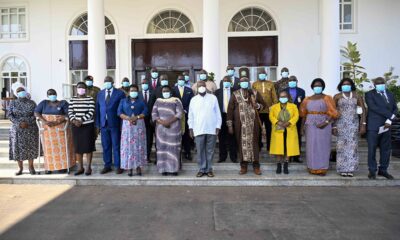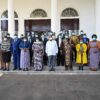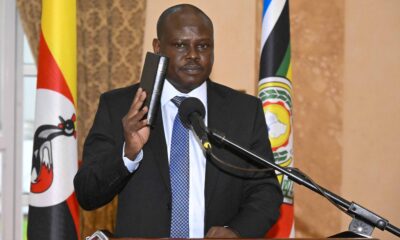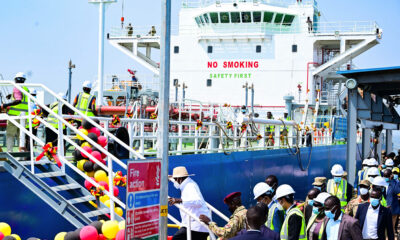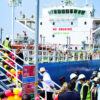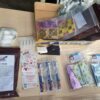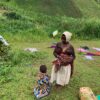News
Presidential Address on State of the Economy
Countrymen and Countrywomen,
Greetings. I am here today to remind you of the challenges we have been able to face and successfully handle, together, in the last three and a half years. The following have been the challenges:
- Locusts (enzigye);
- the rising waters of the Lakes;
- the landslides;
- the floating islands that were threatening to destroy the power dams;
- the Armyworms (kanyanaanga);
- the Covid-19 pandemic;
- the terrorist attacks in Kampala and the
bijambiya (machete) killers in Masaka;
- the resurgence of cattle-rustling in Karamoja and the surrounding areas;
- and, recently, the rising costs of commodities on account of the globe recovering from the Covid-19 pandemic and the War in Ukraine.
As usual, those who do not believe in God and in themselves, started panicking and predicting doom. However, we, the NRM fraternity, whom God has enabled to handle even bigger problems in the past, such as the wars emanating from the unconstitutionalism in Uganda between 1966 and 1986, were sure that each and everyone of these challenges could be rationally, not irrationally, handled. As we speak today, many of these challenges have been handled. Indeed, many Ugandans may have even forgotten about these problems. Where are the locusts? Where are the floating islands, etc.? Of all these problems, the Covid-19 pandemic, was the most challenging. Why? It was because, after a quick but careful analysis, we saw that the pandemic could, indeed, be handled but with massive lockdowns, starting with the unprecedented sending home, prematurely, of our 15 million grandchildren (the learners – pupils, students) in the Primary Schools, the Secondary Schools, the tertiary Institutions and Universities and keeping them there for one and a half years. I do not think that this figure included the pre-primary pupils. No sooner had the pandemic confronted us, than the “struggle between the two lines”, to use Mao Tse Tung’s words, started. This is the struggle between the correct line of the revolutionaries (the change-makers) and the line of the reactionaries (Wapinga maendeleo); the struggle between the “narrow path that leads to heaven and the broad road (Omuhanda Rugyeendwa) that leads to Gehena (hell), as it says in the Book of Matthew Chapter 7 Verses13-14.In the Book of Genesis, Chapter 1 Verses 26-28, it talks of Man “establishing dominion over nature”. As I normally like to quote, it goes as follows:
“26Then God said, “Let us make mankind in our image, in our likeness, so that they may rule over the fish in the sea and the birds in the sky, over the livestock and all the wild animals,[a] and over all the creatures that move along the ground.” 27 So God created mankind in his own image, in the image of God he created them; male and female he created them. 28 God blessed them and said to them, “Be fruitful and increase in number; fill the earth and subdue it. Rule over the fish in the sea and the birds in the sky and over every living creature that moves on the ground.”
Right from the beginning, God empowered man to use his superior brain to find solutions to the problems that confronted him.
The struggle between the two lines, therefore, was as follows: the revolutionary side (our side) pointed out that what was primary was to avoid death (massive death – ekyorezo), all other problems notwithstanding. The reactionary line was to emphasize the loss of jobs, loss of businesses, loss of school time, pregnancies of young girls, etc. Our line was that ebizibu (problems) are not equal (comparable) to death (okufa). Death is irreversible, while problems are reversible at the appropriate time. “Ekitatta Muhima, tekimumalako ente”, we say in Luganda (if a Muhima does not die, even if he loses cows, he will, in time, recover them).
What were the results of the struggle between the two lines? The extreme example of the line of ebizibu (problems) are equal to death (okufa), was the European Country of Sweden. Up to now, they have a total of 18,941 people dead from the small population of 10.2.million people. Other countries were oscillating between the two lines and the losses, up to today, are as follows:
USA – 993,691,
UK – 177,890,
France – 144,449,
Germany – 138,204,
Italy – 165,738,
Spain – 105,642,
India – 524,323,
South Africa – 100,898, Argentina – 128,776, Brazil – 665,319.
In Uganda, the death toll up to now is 3,600, out of a total of 164,153 that were infected. Our total population is now 43million people. Those are the results of the recent struggle between two lines. Our deaths from corona up to March 2021, were only 335 persons. It was the indiscipline of the opposition during the elections that pushed the figures to the present 3,600. On account of the strictness, taking the Biblical narrow-path, Uganda, up to now, has had two waves of the corona pandemic, while other countries have had 3 and even 4 waves.
In Luganda, we say: “Akutwaala ekilo, omusiima bukedde” (the one who successfully guides you in the night, you thank him in the morning for the good work). Now that we are emerging from the consecutive nights of problems (Locusts, rising waters of the Lakes, terrorism, cattle-rustling, covid-19, etc.), it is time to both thank the NRM and reconfirm its credentials as a no-nonsense, problem solver.
As the other problems were being solved or waning in severity, in comes the problem of high costs for commodities. Of course, the problem of high commodity prices is much easier to deal with and it is not new. At the beginning of the NRM
Administration in 1986 and for the period 1972-
1986, following the expulsion of the UgandanIndian entrepreneurs by Idi Amin, Uganda experienced continuous high inflation, severe shortages of commodities (so called “essential commodities”), very high prices, forex black market (Kibaanda), smuggling of goods out and into Uganda (magendo) and speculation (kusamula). All these were solved by the NRM and, indeed, the recent problem of ekyengera (omweeru – surplus) of sugar, soap, maize, milk, bananas, cement, mitayimbwa (steel bars) etc., is a result of that success. This is why we have been engaging with neighbours (eg. Tanzania, Kenya, etc.) to help us solve the problem of ekyengera (surpluses – omweeru). How did the NRM solve the problem of ebula ry’ebintu (eibura, shortages) of between 1972-1986? We shall see how in this document. However, this history is clear. Therefore, the recent phenomenon of high commodity prices, is, indeed, a problem but it is easier to solve than, for instance, Covid-19 was. Covid-19 needed severe restrictions and new science (eg. Vaccines). This one will be solved with existing knowledge but rightly applied.
The high commodities prices are from the following factors:
- The end of covid-19 pandemic, meant that sectors of the economy that had been closed, such as hotels, suddenly opened when the production of, for instance, palm oil for soap manufacture had also declined because there had been no demand for two years. The resumed production levels cannot yet match the demand.
- I also hear, that some of the producers decided to turn their palm oil into petrol, just like we were about to turn our surplus sugar into petrol as a way of solving the problem of kyengera (surplus).
- The war in Ukraine and Western sanctions on Russia, have also caused shortages of wheat for the bread-eaters that do not include me because I am a muhogo-karo-banana eater and milk drinker, fertilizers, petrol, gas, etc.
Again, here, we confront the struggle between the two lines: the revolutionary, patriotic line of the truth and seriousness on the one hand and the reactionary line of populism, cheap popularity and lack of realism of: prices-control by Government, subsidies, tax cuts on the other hand. Although this is not as serious as covid-19, the choices here, are also with serious implications. It is a choice between okubandama (collapse) of the economy on the one hand or survival (kwetaasa, kuhonoka). The real medicine for high prices and shortages, is increased production. Produce more, if you can.
In 1986, as we were beginning to deal with the catastrophic situation of shortages that had characterized Uganda for 14 years, starting with the 1972 mistake of Idi Amin expelling our Asian business people, there was talk by some of price and rent control. In one Cabinet meeting, we were informed of an Indian known as Gandesha that owned many buildings in Kampala and was charging exorbitant rents. Some were saying that we should invoke the Rent Control Act and the Government should set the rent levels itself. After careful analysis, we rejected that logic. The solution we adopted, was letting rent-levels remaining high for that time. This would attract many people to invest in housing. It is that flooding into housing, that would solve the problem of high rents by making rentable buildings many. That is how the huge growth of buildings in the Kampala – Entebbe – Wakiso – Mukono area, was triggered. Within a year or two, I started hearing of there being so many houses for rent, that many of them had no People to rent them.
Shaku shaku: Shambagira (riddle). Nyabweengye, n’obweengyebwe (Each wise person has got his own smart solutions to problems). What is the answer to the riddle? N’enkoko, kuchuutsya, etaine mabeere. It is the hen bringing up its chicks, when it has no breasts to feed them.
Now, coming to the issue of high commodity prices of: petrol, diesel, sugar, salt, bar soap, powder soap, cooking oil etc., we have to remember the nature of the challenge: Kubandama (collapse) or survive (kuhonoka). As already pointed out above, the problem of high commodity prices is not as dangerous as covid-19. However, if it is not handled correctly, it can lead to collapse. Yet, with patience and correct response, it will turn out to be an advantage for the country.
Straight away, a serious problem solver, would cluster the commodities with high prices into two clusters: the imported ones on the one hand and the locally produced ones on the other hand. Some of the ideas people think about when confronted with high commodity prices, are the idea of subsidy (Government okutu kwatirako) or removal of taxes by Government from those commodities. With imported commodities, this is a recipe for disaster. It will lead to collapse. Why? Let us take the example of petrol. A litre of petrol before the rise of prices in November 2021, was Ugx. 4,590 which meant USD 1.3 at that time. A litre of petrol is now Ugx. 5,500 which means USD 1.48. This is all with the tax. The more expensive litre of petrol (ey’obuseere), is doing two bad things: emptying the pockets of the consumers, but also emptying our national dollar reserves. We now have USD 4.5 billions in our Reserves. These are enough to support imports for 4.2 months. If we subsidize or even just remove the taxes on imported commodities, the level of consumption will either remain the same, but this time each litre taking more dollars, or actually increase. The dollar drain will now increase per litre and also, worse, people may buy more of this expensive commodity. With the Great Lakes area, there is another problem – smuggling (magendo). When an item is cheaper in one country, eg. Uganda, there is a powerful incentive for smugglers to buy cheap in Uganda and sell expensively in the neighbouring country. Therefore, cheaper petrol in Uganda, would be cheaper for the Region. It would seriously encroach on our reserves. Moreover, the removal of taxes on some of the commodities, would mean tax loss to Government of: Ugx. 1.53 trillion for petroleum, Ugx. 1.15 trillion for diesel, Ugx. 520 billion for wheat. How, then, do we fund our budget for – roads, electricity, schools, medicine, security, etc.? There are items we do not tax – eg. Medicine, raw materials, etc. It is, therefore, not true that we tax everything. The very crucial items, are not taxed. Therefore, removing taxes or subsidizing many of the imports is suicidal and a blunder.
In my head, I had sympathy for removing taxes on locally produced goods such as sugar, milk, cement, etc. because, if People buy more of them, it will be good – they would be buying more local goods. This was until I looked at the taxes to be lost. On sugar, we would lose Ugx.193 billion, on cement, Ugx.200 billion, mitayimbwa Ugx.120 billion. We could see that the route to tax cuts and subsidies, even for the locally produced goods, was not a wise one. What, then, is the wise way? The wise ways are, therefore, the following:
- To use frugally these imported items (kukekereza, kwereembareemba) or
kubyesonyiwa (get alternatives);
- To use our own raw-materials – such as sunflower oil and castor oil (enshoga-shoga) for soap as we wait for the expanded palm oil production which takes longer – sunflower takes only 4 months; for bread, we can use our banana and cassava flour for bread-making apart from eating the traditional foods; for many years now, I do not eat wheat bread nor rice; I eat our richer indigenous foods of akaro (millet), muhogo (cassava), empogora (bananas cooked in their skin), ebinyobwa (G-nuts), obushaza (peas), enyamay’ente (beef), etc.
Nearing 78 years of age in September, I am doing very well. I have no hesitation bearing testimony for our much better indigenous food. Millet is the only cereal in nature that has got protein, carbohydrates and iron. I had also read something comparable for sorghum. However, for the indigenous sorghum, there was the problem of some bitterness. However, with bio-technology by our researchers, the bitterness can be removed. We, the Ntungamoists, the only advantage we found in bread was convenience in storing and transporting. This is what Dr. Muranga in Nyaruziinga, in Bushenyi, is going to solve with the banana flour and cassava flour which is much healthier than wheat flour that has got the problem of dry glutin which is 9.9% and, therefore, is not good for the human body. The ministry of agriculture is going to guide you as to how our farmers can up-scale the production of sun-flower and castor oil seeds for vegetable oil for soap making as well as bananas and cassava for flour for bread. Sun-flower takes just 4 months and castor oil seeds (enshoga-shoga), take between 140 – 180 days to produce pods. With Palm oil, I hear that Indonesia and Malaysia have banned the export of that item and, therefore, removing the tax will not change anything.
This leaves the problem of petrol and diesel, products for which we do not have an easy local replacement until our own oil comes on stream in, 2025 with first production and the refinery expected in 2026 and we refine some of it for the final products. Even before the War in Ukraine, the price of fuel was going up, on account of the worry by the fossil fuels producers of the global movement for clean energy (solar, wind, nuclear, geo-thermal, hydro-power, hydrogen, etc.). On account of that fear, the petroleum companies were, apparently, no longer exploring for new reserves. Yet, the new clean energies, would take time to be available. The Russian-Ukrainian war, has made it worse. Just before the Ukrainian war, the price of crude was USD 80 per barrel. It is now USD 114 per barrel. Therefore, the Ukrainian war, has added another USD 34 per barrel. Of course, this is an artificial addition caused by the countries of the Global North (the Bazungu) mishandling their bilateral relations and also mishandling global affairs as well. We are quietly engaging these actors to see how these actors can remove this artificial burden from the World. Nevertheless, this artificial distortion, should not divert us from our long-distance journey of achieving social-economic transformation because that is the only way of not only increasing our affluence but also immunizing ourselves against the mistakes of others.
Inspite of being obstructed by some elements within Uganda that many times delay our programmes, the way we have been able to transcend the recent challenges of locusts, rising Lake Waters, Covid-19, etc., shows that we are moving towards that state of immunity from the mistakes of others. Even with the high commodity prices, we are still doing much better than many countries in the World. Our inflation has risen from 2.7% before the artificial crisis to 4.9% now. Compare this with other countries: UK 9%, USA 8.3%, France 4.8%, Germany 7.4%, Italy 6%, Spain 8.3%, Russia 17.8%, China 2.1%, Kenya 6.47%, Tanzania 3.8%, Rwanda 10.5% and Ghana 23.6%.
If it was not for the endless obstructions to our programmes, eg. The Palm Oil project in Buvuma, Sango Bay – we would even be much better off. With our coming Oil, Uganda will be immune to the external disruptions. Working with our African brothers, Uganda and Africa will be prosperous irrespective of the actions of the mistake makers, short of using nuclear weapons among themselves which may affect the whole World. Let us, therefore, not be diverted. We are self-sufficient in food (maize, bananas, cassava, milk, beef, Irish potatoes, beans, peas, fruits, etc.). This is one of the most important factors for survival in times of peril like these. We have good infrastructure, we have a strong Army for guaranteeing peace and we are beginning to pay our scientists well. Nothing can stop us from growing if we work with our African brothers and sisters and other people of good will.
Actually, in my opinion, the only, really serious, vulnerabilities for Uganda, are two: continuing to depend so much on rain-fed agriculture and the damage to our incomparably good environment by encroaching on the wetlands (ebisharara, ebitoogo), Lake Shores (emyegyeego), river banks (enkuungu), forests and steep gradient mountain cliffs (ensa). I have agreed with both the Ministries of Agriculture on enhanced irrigation and with the Ministry of Environment on restoring our wetlands by promoting fish-farming on the edges (emiiga) instead of drying them with swamp rice growing, restoring the forests, etc. We should even agree with the Coastal Countries (Kenya and Tanzania) on, possibly, using nuclear energy to desalinate seawater as an insurance in the face of the erraticness of the rain caused by the sabotage by the mistakes of global mistake-makers.
In conclusion, I repeat that the only, really, serious dangers to our future are: reliance on only rain-fed agriculture; damage to our environment; and a nuclear-war among the mistake-makers.
During the State of the Nation Address on the 7th of June, 2022, I will touch on the issue of the so called “coffee deal” that was being discussed in Parliament that other day. I could see fundamental disorientation in the position of some of the speakers that were speaking in Parliament.
Uganda, indeed Africa, being in a slave-relationship with external actors, is not comparable to any other factors.
To recapitulate (summarize), we need to know and do the following:
- Subsidies for and removing taxes from imported products is definite suicide because it will deplete both the family savings and the National Reserves, leading to inability to pay for imports because foreigners beyond East Africa do not accept the Uganda shilling as a unit of exchange. They insist on the dollar, gold, etc.
- The correct action is to kukekereza (being frugal) – kwereembareemba or kubyesonyiwa (get alternatives for the non-oil items).
- With the internally produced commodities, I was tempted to look at removing taxes because, with these, increased consumption would favour Uganda. However, the tax loss of Ugx. 193 billion for sugar, Ugx. 200 billion for cement, Ugx. 120 billion for mitayimbwa, would cripple our budget and the planned developments. Some of these challenges are temporary. We have been having the phenomenon of low commodity prices eg. for maize, etc. It is the continued development of the economy that will get us to the stability of a more integrated economy. Only a few months ago, I opened a new factory of industrial sugar in Kinyara. This is the sugar, that is used in Coca Cola as refined sugar, different from the raw-sugar for tea. It is also used for medicines like children’s syrups. Its opening, was helping us to tackle the issue of surplus sugar. There are plans to get petrol out of sugar. With that phenomenon of a more integrated economy, the instability of ekyengera withlow prices today and, then, ebula with high prices tomorrow, will be tamed.
- With petrol, diesel and paraffin, the artificial crisis of the Bazungu has added another $34 dollars. We are engaging the involved actors on this. When we succeed here, we shall remain with original reason of the fossil fuels being worried about the clean energy sources. That will be much better than where we are now. It is important for Ugandans to know that even when we get our own petroleum, we cannot sell it below the World prices minus transport costs.
I thank you everybody for listening.





